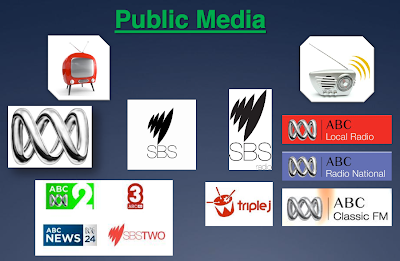 |
| Australian Public Service Broadcasters |
Public media's mission
But come 1985 the Broadcasting Research Unit took it upon themselves to complicate this simple ideal with a list of components a PSB must involve:
- Geographical universality. Not an easy feat when it comes to Australia.
- Universality of appeal of programming. Again, catering for an entire population... not easy.
- Providing special provision for minorities, particularly those of a disadvantage. Kind of conflicts with the above point.
- Recognise their special relationship to the sense of national identity and community.
- Distanced from all vested interests, particularly from those of the current government.
- Universality of payment. One main instrument of broadcasting should be directly funded by the corpus of users.
- Structured as to encourage competition in good programming, rather than ratings. On smaller budgets than commercial, in an industry fueled by ratings, sure...
- Should liberate rather than restrict broadcasters.
The functions of PSB all revolve around the nation. Whether it's nation building, sharing national heritage, forming a national identity, or providing a platform for national conversation; the focus is citizens, not consumers. "The difference between commercial broadcasting and public broadcasting is the difference between consumers and citizens." (Nigel Milan)
But (yes there's a but), what does this mean now with the rise of the digital age? Seeking content from overseas (don't pretend you've never Googled 'watch Amercian Tv Show online') are we becoming global citizens, and does this make the nationalistic role of PSB irrelevant? And while I'm throwing out questions, did the creation of SBS let the ABC off the hook in terms of transforming its representations of Australia as multicultural, and imagining its audience as linguistically and culturally diverse? Think about it.
News. This is why majority of us like PSB (Chris Lilley and The Chaser programs excluded). Eighty-five percent of us consider the ABC unbiased. They (SBS included) seem to take their news seriously, present it in a 'broadsheet' style, value importance over interest, and really take the time to consider their news. But
The problems faced by PSB often stems from their core. Being expected to produce quality programming, with what money? Make themselves relevant to masses while making special provisions for the minorities? Provide programming that engages with the democratic process, but how to balance this? Be independent when dependent on government funding? HOW?
Wow, this is has been a lot more deep than I was expecting. To lighten the mood, one of my favourite television moments, aired on none other than the ABC.
Disclaimer: The title isn't my personal opinion. Just something I thought was punny.
No comments:
Post a Comment